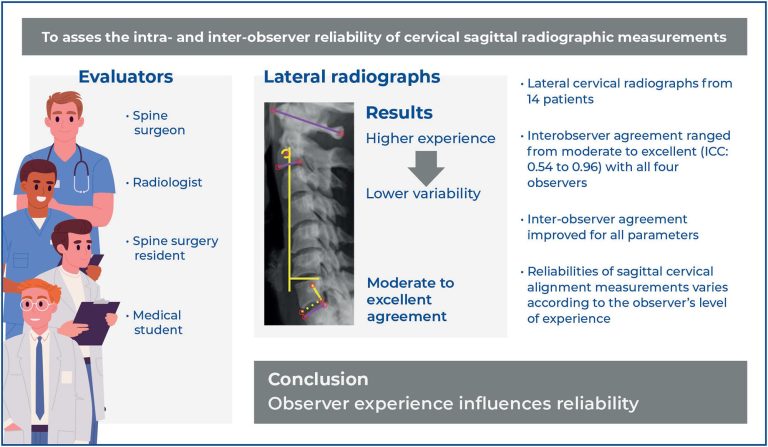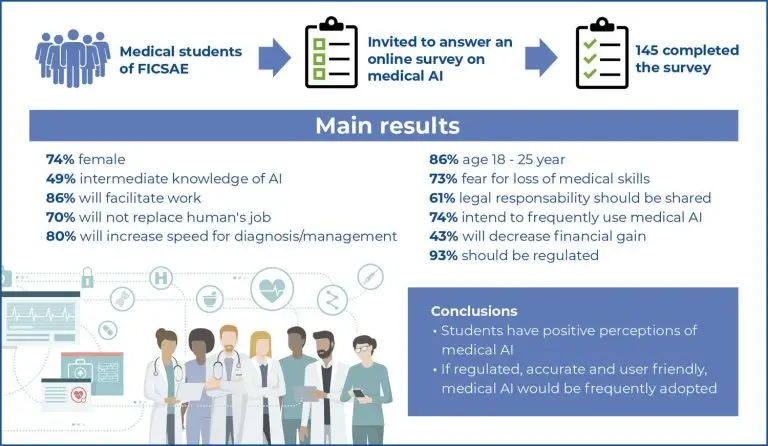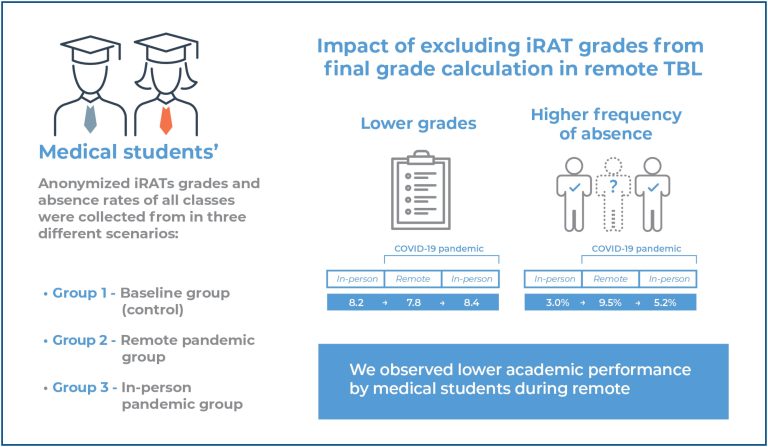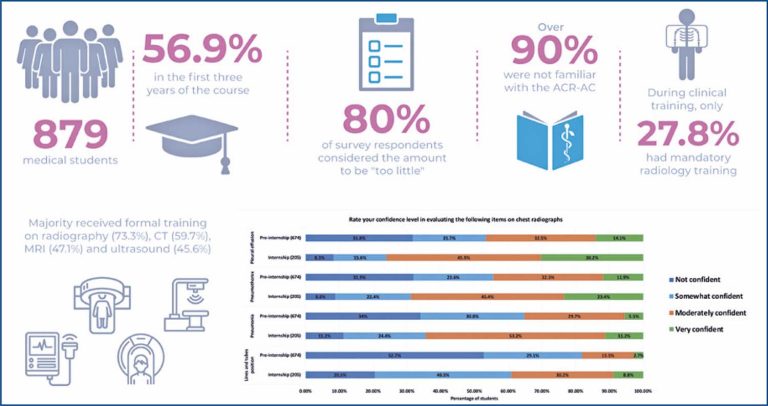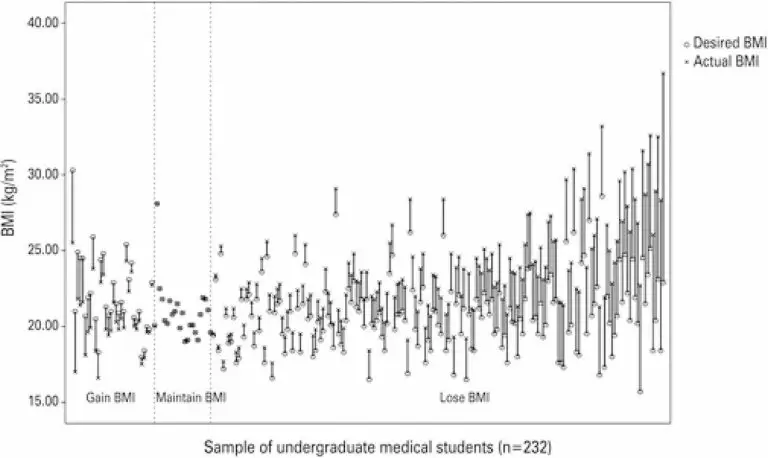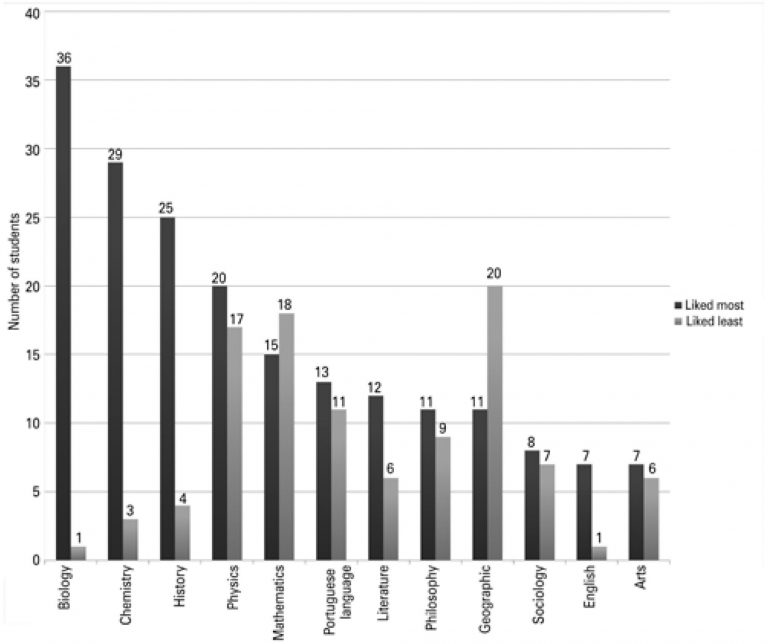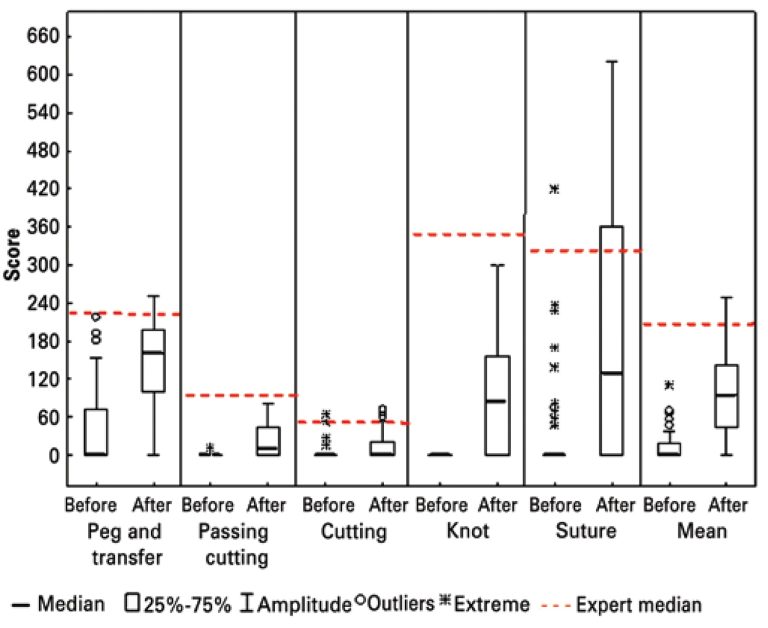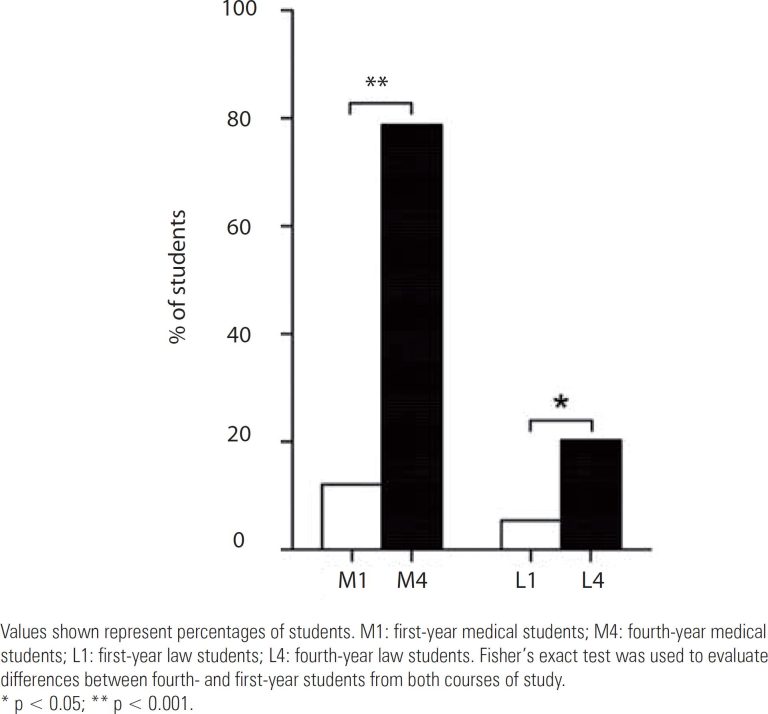13/Nov/2025
Intra- and inter-observer reliabilities of cervical sagittal radiographic measurements among evaluators with different levels of training
einstein (São Paulo). 13/Nov/2025;23:eAO1947.
View Article13/Nov/2025
Intra- and inter-observer reliabilities of cervical sagittal radiographic measurements among evaluators with different levels of training
DOI: 10.31744/einstein_journal/2025AO1947
Highlights ■ Observer experience improves radiographic measurement reliability. ■ Spine surgeons and radiologists exhibited the highest intra-class correlation coefficients. ■ The cervical sagittal vertical axis showed the greatest inter-observer variability. ■ Standardized training may enhance measurement consistency. ABSTRACT Objective: To assess the intra- and inter-observer reliabilities of cervical sagittal radiographic measurements performed by evaluators with varying levels of clinical experience. Methods: This study analyzed lateral cervical radiographs from 14 patients who had undergone single-level anterior cervical discectomy and fusion. Four […]
Keywords: Cervical vertebrae; Diskectomy; Observer variation; Radiographic image interpretation, computer-assisted; Radiologists; Reproducibility of Results; Spinal fusion; Spine; Students, medical; Surgeons
22/Sep/2025
Attitudes, knowledge, opinions, and expectations of medical students towards medical artificial intelligence solutions: a cross-sectional survey study
DOI: 10.31744/einstein_journal/2025AO1401
Highlights ■Most students have a positive attitude towards medical artificial intelligence. ■ Artificial intelligence solutions would be frequently adopted if accurate, fast, and user-friendly. ■ Expectations include work facilitation and increased diagnosis and management speed. ■Most fear losing medical skills to artificial intelligence and desire governmental regulations. ABSTRACT Objective: To assess medical students’ attitudes, knowledge, opinions, and expectations regarding medical artificial intelligence solutions, according to their sex and year of study. Methods: This cross-sectional survey was a single-center study conducted […]
Keywords: Adoption; Artificial intelligence; Knowledge, attitudes, practice; Perception; Students, medical; Surveys and questionnaires
24/Jan/2025
Remote team-based learning during COVID-19: lower academic performance is associated with the exclusion of test grades from final grades
einstein (São Paulo). 24/Jan/2025;23:eAO1007.
View Article24/Jan/2025
Remote team-based learning during COVID-19: lower academic performance is associated with the exclusion of test grades from final grades
DOI: 10.31744/einstein_journal/2025AO1007
Highlights ■ Remote team-based learning sessions were conducted during the COVID-19 pandemic, and their grades were not included in the final course grade calculation. ■ Remote team-based learning resulted in lower iRAT grades than in-person team-based learning, independent of the semester. ■ Remote team-based learning resulted in more students failing the test than in-person team-based learning. ■ Remote team-based learning resulted in lower student attendance than in-person team-based learning. ABSTRACT Introduction: The COVID-19 pandemic necessitated a shift from in-person to […]
Keywords: Academic performance; Educational measurement; Group process; Learning; Problem-based learning; School, medical; Students, medical; Team-based learning
07/Mar/2023
Diagnostic radiology training for medical students – a Brazilian multicenter survey
DOI: 10.31744/einstein_journal/2023AO0184
Highlights Understanding how diagnostic radiology is taught in Brazilian medical schools. The students’ perception on their radiology training and its importance. Which methods are used to teach, both in pre-clinical and clinical years. ABSTRACT Objective This study aimed to assess diagnostic radiology training and exposure during medical school, from the perspective of medical students in Brazil. Methods In this multicenter study approved by the Institutional Review Board, medical students from multiple universities in Brazil filled out an online questionnaire […]
Keywords: Clinical competence; Education, medical; Health knowledge, attitudes, pratice; Radiology, education; Students, medical; Surveys and questionnaires
28/Apr/2022
Body dissatisfaction among undergraduate medical students in the city of Juiz de Fora, Minas Gerais, Brazil
DOI: 10.31744/einstein_journal/2022AO6648
ABSTRACT Objective To assess the level of body dissatisfaction among undergraduate medical students in the city of Juiz de Fora, Minas Gerais, Brazil. Methods A cross-sectional study with 232 volunteers of both sexes at a private college. The Body Shape Questionnaire was used, which is a tool based on the sum of values that allow classifying body dissatisfaction according to the following scores: less than 111, if absence of body dissatisfaction; between 111 and 138, if mild body dissatisfaction; between […]
Keywords: Body image; Feeding and eating disorders; Mental Health; Nutritional status; Students, medical
11/Sep/2018
Profile of medical students in the first group of the Faculdade Israelita de Ciências da Saúde Albert Einstein
DOI: 10.1590/S1679-45082018AO4228
ABSTRACT Objective: To describe first medical students’ profile of the Faculdade Israelita de Ciências da Saúde Albert Einstein. Methods: Data were collected using an electronic questionnaire during the Biostatistics course in August of 2016. The students were inquired about demographic characteristics, data on their secondary education and college entrance exams, practice of physical exercise, leisure activities done, to have a physician in the family, and specialty that they intended to pursue as a career. Results: Most of the students were […]
Keywords: Education, medical, undergraduate; Students, medical
01/Oct/2014
Development of laparoscopic skills in Medical students naive to surgical training
einstein (São Paulo). 01/Oct/2014;12(4):467-72.
View Article01/Oct/2014
Development of laparoscopic skills in Medical students naive to surgical training
DOI: 10.1590/S1679-45082014AO3237
Objective To assess the acquisition of basic laparoscopic skills of Medical students trained on a surgical simulator. Methods First- and second-year Medical students participated on a laparoscopic training program on simulators. None of the students had previous classes of surgical technique, exposure to surgical practice nor training prior to the enrollment in to the study. Students´ time were collected before and after the 150-minute training. Skill acquisition was measured comparing time and scores of students and senior instructors of laparoscopic […]
Keywords: Laparoscopy; Models, educational; Students, medical; Surgical procedures, operative/education
01/Jul/2010
Research knowledge in undergraduate school in Brazil: a comparison between medical and law students
DOI: 10.1590/S1679-45082010AO1702
ABSTRACT Objective: Exposure to science education during college may affect a student’s profile, and research experience may be associated with better professional performance. We hypothesized that the impact of research experience obtained during graduate study differs among professional curricula and among graduate courses. Methods: A validated multiple-choice questionnaire concerning scientific concepts was given to students in the first and fourth years of medical and law school at a public Brazilian educational institution. Results: Medical students participated more frequently in introductory […]
Keywords: Education, medical, undergraduate; Research; Students, medical
01/Apr/2010
Assessing knowledge of Medical undergraduate students on palliative care in end-stage disease patients
DOI: 10.1590/S1679-45082010AO1464
ABSTRACT Objective: To assess the knowledge on palliative care of undergraduate medical students of the 9th and 10th semesters at Universidade Nove de Julho. Methods: A self-applied and self-explanatory questionnaire was prepared with 9 objective questions and given to 50 undergraduate medical students of these semesters. The content was related to palliative care, addressing some topics, such as orthothanasia, dysthanasia, euthanasia and clinical cases. The questionnaire was applied from November 2007 to February 2008. Results: As to correct answers, the […]
Keywords: Health Knowledge, Attitudes, Practice; Hospice care; Students, medical


